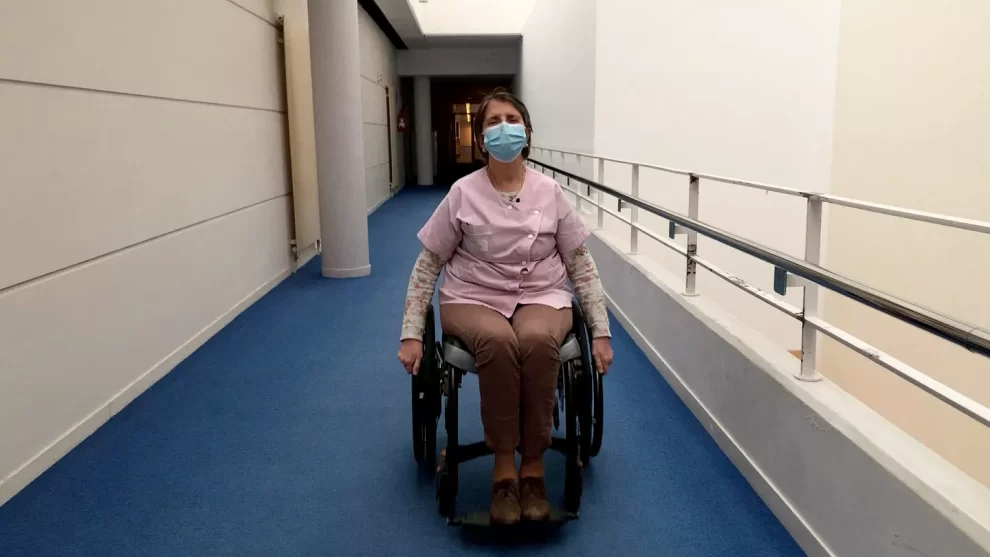Sterilisation of women with disabilities is legal in France after the law changed in 2001. Despite being banned by the Istanbul Convention, it is only criminalised in 9 EU countries.
In a small gynaecological clinic in Paris, Béatrice Idiard-Chamois, a midwife, welcomes a new patient.
She is a young woman, autistic and non-verbal. She comes with her mother and a midwife working in the institution for disabled people where she is about to be admitted.
They ask for her fallopian tubes to be tied despite her never having had sex.
The consultation goes smoothly. Idiard-Chamois performs an external examination.
The woman, unable to speak because of her disability, does not express any disagreement. But Idiard-Chamois feels disturbed by her colleague – the midwife from the institution where the woman lives, who’s surprised when the sterilisation request is refused.
Although it’s not officially stated, « these institutions always require the residents to take contraceptives, » says Idiard-Chamois, as « it avoids problems ». In more than 100 cases that she has dealt with, the women who were living in institutions were taking some form of contraceptive treatment.
« It’s the Institution that gives the pill to women. It is prescribed by a psychiatrist, not even a specialised doctor. They give the same pill to all of them without a gynecological examination, » she says.
Idiard-Chamois started the only clinic in France specifically for women with disabilities at L’Institut Mutualiste Montsouris in Paris in 2015.
Since then, she has seen more than 700 patients and received half a dozen sterilisation requests for people with disabilities living under a guardianship, « mostly from their parents », she stressed.
She always tries to dissuade them and offer « less violent and permanent » alternatives.
In the case of this young woman, her mother and legal guardian accepted one of these alternatives, but this is not always the case.
« We suspect that there are probably sterilisations carried out without real consent, at the request of families who are the ones that arrange it with the gynecologist, » says Dr Catherine Rey-Quinio, medical advisor of Ile-de-France Regional Health Agency.
Rey-Quinio says she has received an average of two to four requests for sterilisation per year over the past decade but only two in the last four years. Both of them took place in 2021 and had the support of the regional committee of experts that evaluate each petition for sterilisation.
Euronews sent a request to all of the French Regional Health Agencies which have not shared their data.
The only official statistics collected at a national level date back to 1998. According to a report by the French General Inspectorate of the Social Sector (IGAS), about 500 women with disabilities were forcibly subjected to tubal ligations every year.
Is it possible to ensure consent?
« It’s clear, if a woman says no, it’s no », says Didier Seban. The lawyer, working at Seban Avocats, stresses that the most important part of the law is to ensure the consent of women with disabilities.
The judge must make sure that the person under guardianship has understood the process and agrees to it.
But how easy is it to ensure consent? Especially when the woman’s disability makes it difficult for her to express it orally.
It is at this point where abuses can occur.
“We have to be realistic. When the mental disability is severe, women do not understand what we say, they do not speak, sometimes they even move very little, so we know very well that they cannot have a say”, says Ghada Hatem, a gynaecologist working for the committee of experts which evaluate each sterilisation petition.
This is why « we ask parents or guardians when it seems reasonable to us », she admits.
Although the opinion of the committee – made up of gynaecologists, psychiatrists and organisations – is non-binding, Hatem says the judge hardly ever goes against their advice.
Before sterilisation, experts have to make sure that any other method of contraception can be taken. However, the gynaecologist refutes this argument.
« What would be the point of doing something that is not irreversible? If we knew that in five years her disability would be cured and she would be able to take care of her child independently. But this is not true, so what’s the point of choosing something that has to be renewed periodically?, » she argues.
« We can’t dream », agrees Dr. Rey-Quinio, who coordinates the committee of experts of Ile-de-France from Paris.
The medical decision in these cases is based on « what we consider the benefit-risk of the intervention for the patient ».
This is what happened in 2016 to one of Idiard-Chamois’ patients. The gynaecologist working with the midwife signed the recommendation for the judge to sterilise a girl who was unable to express her will.
It is the only request for sterilisation they have accepted since they opened their clinic. The midwife says she did not agree and did not sign.
« The patient was a young woman for whom the contraceptive implant had not worked and her mother kept harassing us to sign the authorisation, » she recalls, annoyed that they were not able to seek the patient’s consent.
Source: Euro News































